“I think we might work a deal and if we don’t, I may go that route. I have the absolute right to do [a] national emergency if I want.”
That was President Donald Trump’s response to a reporter asking why he has not declared a national emergency at the southern border and opted to utilize unspent military construction funds to build the border wall.
The idea would be to invoke authority that Congress has granted under the National Emergencies Act. As noted by the National Review’s Andrew McCarthy, 33 U.S. Code Section 2293(a) provides that “In the event of a declaration of war or a declaration by the President of a national emergency in accordance with the National Emergencies Act [50 U.S.C. 1601 et seq.] that requires or may require use of the Armed Forces, the Secretary, without regard to any other provision of law, may (1) terminate or defer the construction, operation, maintenance, or repair of any Department of the Army civil works project that he deems not essential to the national defense, and (2) apply the resources of the Department of the Army’s civil works program, including funds, personnel, and equipment, to construct or assist in the construction, operation, maintenance, and repair of authorized civil works, military construction, and civil defense projects that are essential to the national defense.”
But, writes McCarthy, that does not mean it’s a great idea for Trump to pursue the wall unilaterally, who called the provision of law “counter-constitutional.” In other words, it is a sweeping grant of power that Congress vested in the Office of Presidency to act as if Congress was not there.
Trump shouldn’t have to go there to get the wall built. It should be enough that the President won’t sign a spending bill that fails to fully fund the border wall and that Congress lacks the votes to override his veto. Lacking the votes to override his veto, Congress, including House Speaker Nancy Pelosi (D-Calif.) and Senate Minority Leader Chuck Schumer (D-N.Y.) cannot impose their will on the President. That should be the beginning and end of that discussion.
There are other things Congress needs to act on, as well, as there is more the President is seeking to accomplish to complement his steel barrier approach to border security. He’s requesting funds for more immigration judges, border patrol agents, detection equipment, detention facilities and the like, to address the overflow of illegal aliens flooding the border.
Moreover, the President must consider that declaring an emergency and building the wall himself gives Congress an easy out even though the law provides for it. They need only wait for Trump to grow weary of the partial government shutdown and then they won’t have to take a tough vote, particularly Democrats. They don’t want to have to go back to their constituents after they vote to reopen the government and build the wall after promising they wouldn’t. It would disappoint and dispirit their political base.
In that sense, Democrats have painted themselves into a corner. They have staked out untenable ground, where the only way the government reopens is if the President and the GOP Senate comes away with nothing to satisfy their own priorities on the southern border. What makes them think Republicans would just surrender?
Which is why Trump should not give in, even if declaring a national emergency appears as a tempting exit ramp to achieve his policy without Congress.
For starters, there’s no guarantee he would prevail in what appears to be an inevitable court challenge. Since this is a national emergency, the last place Trump should want the wall to go is in the 9th Circuit Court, which will shoot this down in like a day and then it will languish in the courts for months or years.
If this is truly a crisis that must be addressed now, then there is no replacement for Congress. The way to get this done is right now.
Also, note how anxious certain media outlets are for the President to simply declare a national emergency. They know it’s a one-way ticket to court. They also know it lets Congress off the hook.
So far, Trump has said that “My threshold will be if I cannot make a deal with people who are unreasonable,” referring to Pelosi and Schumer, to declaring an emergency and invoking the authority Congress has approved.
But before he goes there, the President should hold Congress’ feet to the fire and exhaust all of his legislative options. Wait as long as it takes and if Congress sends him a bill that doesn’t include the wall, veto it. And then if the veto is overridden, then the National Emergencies Act Hail Mary option can be called if all else fails.
But Congress probably won’t override a Trump veto on the wall. Congressional Republicans instead could rally to President Trump, and force Democrats to the negotiating table. If that means the government is partially shut down for months or years as the President suggested, then so be it. Don’t let Congress off easy. This isn’t just about exercising legal authority that Congress has already authorized, it’s about setting the stage for future spending battles. The Democratic House must not be allowed to impose its will on a Republican Senate and a Republican President.
Robert Romano is the Vice President of Public Policy at Americans for Limited Government.







